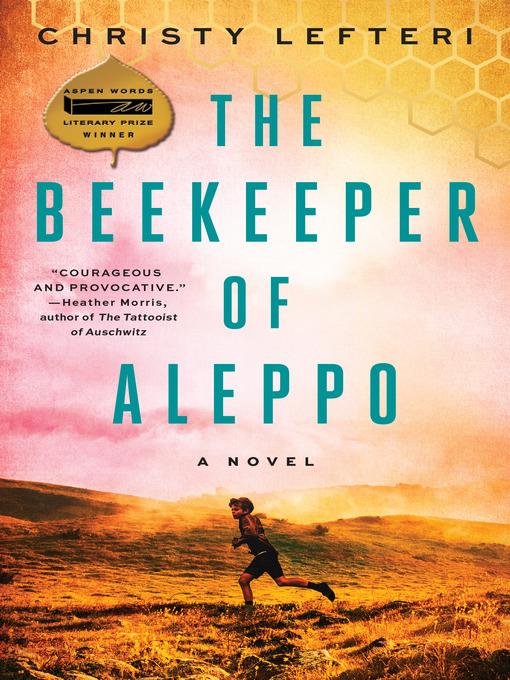
The Beekeeper of Aleppo
A Novel
- اطلاعات
- نقد و بررسی
- دیدگاه کاربران
نقد و بررسی

June 10, 2019
Lefteri (A Watermelon, a Fish and a Bible) tells a haunting and resonant story of Syrian war refugees undertaking a treacherous journey to possible safety. In 2015, Nuri Ibrahim and his wife, Afra, who was blinded in an incident during the Syrian civil war, cling to their home while everyone else flees the bombings and violence. They are emotionally devastated by the loss and destruction of their neighborhood but decide to seek asylum in the U.K. after soldiers attempt to forcefully recruit Nuri. They travel through harsh conditions in Turkey and Greece, waiting in camps for the proper paperwork and meeting more refugees along the way. Nuri is determined to find his cousin Mustafa in the U.K., where the two men can return to their beloved work as beekeepers. Afra reckons with the reality that she will not be able to continue her life as an artist because of her blindness, and the couple recall painful memories as they are drawn into the agonizing experiences of other refugees. Lefteri perceptively and powerfully documents the horrors of the Syrian civil war and the suffering of innocent civilians. Readers will find this deeply affecting for both its psychological intensity and emotional acuity.

July 1, 2019
The human stories behind news images of Syrian war refugees emerge in a novel both touching and terrifying. Lefteri (A Watermelon, a Fish and a Bible, 2011) is the child of refugees, raised in London after her parents fled Cyprus in the 1970s. This novel's characters are fleeing a different war, the current, devastating civil war in Syria. Politics are barely mentioned in the book, though--when war has destroyed your home and livelihood, blinded your wife and killed your young son, the reasons for that war lose their meaning. The novel follows Nuri and Afra Ibrahim as they escape from Aleppo and make the perilous journey to Britain after their son, Sami, dies. Nuri narrates the book; its chapters alternate gracefully among the golden prewar past, the struggle to gain legal refugee status in England in the present, and the journey in between, a long nightmare of chaotically crowded refugee camps, life-threatening sea crossings, and smugglers eager to exploit them. In Aleppo, Afra was an artist; Nuri was the titular beekeeper, a job he loved, in business with his cousin and dearest friend, Mustafa. The war leaves Nuri and Afra no choice but to leave, but her blindness and emotional trauma mean that he must be her caretaker as well as grappling with the bewildering navigation to another country. Along the way, he also becomes the guardian of Mohammed, a lost boy about the same age as Sami. Lefteri says in her author's note that the book was inspired by her volunteer work in a refugee camp in Athens, and Nuri's story rings with authenticity, from the vast, impersonal cruelties of war to the tiny kindnesses that help people survive it. Nuri wants to be the strong one, but Lefteri subtly, slowly shows the reader how deep his wounds are as well. A well-crafted structure and a troubled but engaging narrator power this moving story of Syrian refugees.
COPYRIGHT(2019) Kirkus Reviews, ALL RIGHTS RESERVED.

August 16, 2019
DEBUT The London-raised daughter of Cypriot refugees, Lefteri was inspired to write this first novel after working at a UNICEF-supported refugee center in Athens. In fluid, forthright language, she brings us humbly closer to the refugee experience as beekeeper Nuri and his wife, an artist named Afra who has gone blind from the horrors she's witnessed, escape Aleppo and travel riskily through Turkey and Greece and on to the UK, where Nuri's cousin Mustafa has established an apiary and is training other refugees to tend bees. Afra doesn't want to leave the very soil where they have lost their son, but it's too dangerous to stay. "If they see me again, and I don't join them, they'll kill me. They said I should find someone to take my body," says Nuri persuasively. Along the way, they suffer violence and disillusionment, and if their new life is bittersweet, it brings them family, friends, and a glimmer of hope. VERDICT As Lefteri particularizes the terrible plight of refugees today, there's no overloading the deck with drama; this story tells itself, absorbingly and heartrendingly. Highly recommended. [See Prepub Alert, 2/18/19.]--Barbara Hoffert, Library Journal
Copyright 2019 Library Journal, LLC Used with permission.

July 1, 2019
Afra's vision went dark the moment her son died. The bomb that struck their garden in Syria came after two days of relative peace. Following a harrowing journey that ended in Britain, Afra, now sightless, is staying in a bed-and-breakfast with her husband, Nuri, and other refugees awaiting their fates. In Aleppo, Nuri was a beekeeper with his cousin Mustafa, and the care and tenderness with which they nurtured their bee colonies could not be a greater contrast to the horror and destruction brought by the war. As Afra, once an artist, lost her vision, so Nuri seems to have lost something of himself after the death of their son and their harrowing journey via a smuggler's boat to try to find safety. Nuri's fluid narration merges past and present into a patchwork of memory, pain, loss, and hope, his encounters with other refugees solidifying the suffering of individuals into a larger story of the desolation of displacement. With determination laden in sorrow, Nuri and Afra strive to find their way to a new life and back to each other.(Reprinted with permission of Booklist, copyright 2019, American Library Association.)




دیدگاه کاربران